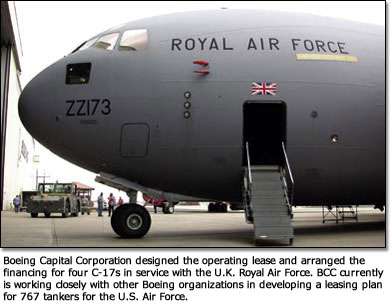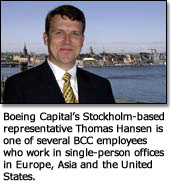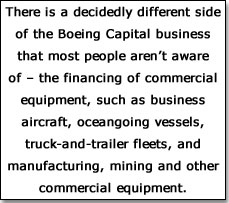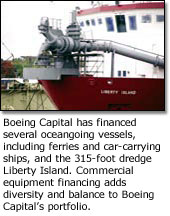| Planes, trains & automobiles
Getting to know Boeing Capital Corporation
BY RUSS YOUNG

 Helping
to establish a broader global presence for Boeing can sometimes be a lonely
job … just ask Cian Dooley. Helping
to establish a broader global presence for Boeing can sometimes be a lonely
job … just ask Cian Dooley.
Dooley is senior director–Europe for Boeing Capital Corporation,
and is the sole occupant of the company's office in Dublin, Ireland's,
vibrant financial district. Along with a Commercial Aviation Services
field representative, he makes up the entire Boeing presence in Ireland.
"Sometimes it feels like Seattle is a lot farther than 7,000 kilometers
(4,350 miles) away," said Dooley. "But being connected electronically,
and having the opportunity to regularly visit our offices in Renton, helps
bridge the gap. Fortunately, it helps to know that there are 174,000-plus
others on your team."
Thomas Hansen can relate. He inhabits Boeing Capital's one-person office
in Stockholm, Sweden, where the rest of the Boeing in-country contingent
is two CAS field representatives at Arlanda Airport.
Yet the presence of Dooley and Hansen in their respective cities, along
with the other "count-the-employees-on-one-hand" Boeing Capital offices
in Brussels, Hong Kong, Atlanta, Austin, Chicago, Detroit and New York,
is a key element of the business unit's long-term vision.
"We are establishing ourselves as a premier, global, full-service financier,"
said Boeing Capital President Jim Palmer. "We have a small — but
growing — number of offices in major financial and industrial centers,
and have our eye on other locations around the world.
 "Having
talented team members who are readily accessible to customers and investors
is a vital part of fulfilling our vision, because financing is really
a people business," Palmer said. "Our competitive advantages are the talent
and experience of our employees, and the strength of the Boeing brand." "Having
talented team members who are readily accessible to customers and investors
is a vital part of fulfilling our vision, because financing is really
a people business," Palmer said. "Our competitive advantages are the talent
and experience of our employees, and the strength of the Boeing brand."
Boeing Capital has leveraged those advantages well since being elevated
to be one of three new Boeing business units in late 2000. Since the end
of 1999, the Boeing Capital portfolio — the total value of the airplanes
and commercial equipment it owns and leases, plus the value of outstanding
loans — has more than tripled to approximately $10 billion. During
2001, revenues increased 48 percent to $663 million, with Boeing Capital's
net income growing 42 percent to $152 million.
Boeing Capital and the financing business may seem somewhat mysterious
and exceedingly complex to many people, but Palmer says the basics of
the business are relatively simple.
"We generate cash from our own operations, in the form of loan and lease
payments. We also receive equity contributions, which are essentially
investments directly from The Boeing Co.," said Palmer. "But the majority
of our capital comes from issuing corporate bonds, which are purchased
by investors with the promise that we will pay interest on a scheduled
basis and pay off the principal amount when the bond matures."
 Using
those funds, Boeing Capital offers two kinds of leases — long-term
and operating leases — and loans, also known as notes. Customers
may choose to borrow for the outright purchase of an airplane, satellite,
ship, machine tool or a wide variety of other equipment types, or they
may choose to lease the same item(s) from Boeing Capital. Long-term leases
are essentially a lease-to-own agreement, while operating leases represent
more of a rental arrangement. Using
those funds, Boeing Capital offers two kinds of leases — long-term
and operating leases — and loans, also known as notes. Customers
may choose to borrow for the outright purchase of an airplane, satellite,
ship, machine tool or a wide variety of other equipment types, or they
may choose to lease the same item(s) from Boeing Capital. Long-term leases
are essentially a lease-to-own agreement, while operating leases represent
more of a rental arrangement.
Boeing Capital currently has 40 percent of its portfolio in long-term
leases, 33 percent in operating leases, and the remaining 27 percent in
the form of notes and loans.
Although many people may identify Boeing Capital with its role in financing
7-series aircraft, commercial airplanes represent only 70 percent of the
business. In addition to providing, and/or arranging financing for Commercial
Airplanes customers, the Renton-based Aircraft Financial Services group
has a fleet of nearly 300 airplanes under lease, as well.
"I believe that a lot of people think we exist just to provide financing
for Boeing Commercial Airplanes customers. That's part of our mission,
but it's important to understand that our decisions are made independently
and our Boeing-related transactions are at market rates," said Palmer.
"We are not what is often referred to as ‘the lender of last resort'
— the source of financing for people who can't get it anywhere else.
Boeing Capital is responsible for generating profits for The Boeing Company."
There also is a decidedly different side of the Boeing Capital business
that most people aren't aware of — the financing of commercial equipment,
such as business aircraft, oceangoing vessels, truck-and-trailer fleets,
and manufacturing, mining and other commercial equipment. The Long Beach-based
Commercial Financial Services group is responsible for such transactions,
which represent about 30 percent of the portfolio.
 Palmer
explains that the rating agencies that establish and monitor Boeing Capital's
credit ratings, and subsequently the pricing of its corporate bonds, like
to see that the company is maintaining a healthy balance between Boeing
products and other types of equipment in case of an aerospace industry
downturn. Palmer
explains that the rating agencies that establish and monitor Boeing Capital's
credit ratings, and subsequently the pricing of its corporate bonds, like
to see that the company is maintaining a healthy balance between Boeing
products and other types of equipment in case of an aerospace industry
downturn.
"Plus, the worldwide commercial financing market is very big, and growing
steadily," Palmer said. "There are opportunities for profitable growth."
The third, and newest, business group within Boeing Capital is Space and
Defense Financial Services. Based in Long Beach, this small-but-active
team works closely with Boeing Satellite Systems and Boeing Launch Services
in providing and arranging financing for satellites and launches.
The group also is involved in arranging lease financing for military transport
airplanes, having placed four Boeing C-17s with the United Kingdom's Royal
Air Force. It also is working closely with the Military Aircraft and Missile
Systems business unit in a proposed 767 tanker lease to the U.S. Air Force.
"It's another example of us leveraging our core strengths, especially
our knowledge of aerospace products and customers," said Palmer. "We'll
continue building on those strengths, developing additional expertise
in our three primary areas."
Palmer stresses that businesses such as consumer credit cards and home
mortgages are well outside of that core, and Boeing Capital isn't interested
in pursuing them.
"We're growing quickly, but in a prudent and profitable manner," Palmer
said. "New business opportunities that supplement our core businesses
are one of the ways that we can sustain that growth, and make our contribution
to Boeing's overall growth and transformation. Expanding the number of
cities — and countries — that we have offices in, and increasing
the size of those offices, is another growth strategy."
|